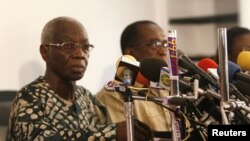Ghana’s police have launched an investigation into an alleged death threat against the chairman of the Independent Electoral Commission (INEC), Kwadwo Afari-Gyan.
“Maybe the intention is to do harm to me, maybe to frighten me. Let me say that I will not be frightened,” Afari-Gyan said. “I will do my work in accordance with the understanding of the rules and regulations under which it operates.”
But an official of the police Criminal Investigation Division (CID) said the inquiry into the alleged threats will determine whether to increase security for Afari-Gyan ahead of the December 7 presidential, parliamentary and local elections.
“The chairman has some kind of protection already, but if we assess the threat and we find out that we have to beef up the security for the chairman, we will do that,” said Frank Kwofi, the assistant commissioner of the police CID.
Kwofi said the police have been gathering intelligence that should help reduce any possible threats in the run up to the December vote.
“Ghanaians should be… assured that the security agencies, particularly the police are ready to investigate, all alleged cases that will come to our notice, and that we are not going to treat [criminals] with soft gloves, and that we are not going to be partisan,” Kwofi said.
“We have a lot of intelligence [gathering] going on, and we will make efforts to deflate all kinds of mechanizations that people are putting in place to sort of frustrate the upcoming elections,” he added.
Opposition parties have often accused the police of bias - an accusation Kwofi sharply rejected.
“We are not partisan, because we investigate all cases that come to our office,” Kwofi said. “When people come to make complaints, we don’t ask them, which parties they belong [to] before we take statements or before we start investigations. But, of course the perception has been that if you are in the opposition, you are not in the [good] books of the police or the security agencies. That has been the tradition and that perception must be eroded.”
Kwofi said the police have been working on a campaign to educate Ghanaians ahead of the elections.
“We have started the education already,” Kwofi said. “We have also inaugurated the police communication monitoring team, which is going to monitor all the airwaves [radio and television], and find out what is going around so that we can react to them as quickly as we can.
“We don’t want anybody to go to the airwaves to create the impression that the police [are] against anybody, because of some partisan considerations,” he added.
Kwofi said formation of the monitoring team is part of police efforts to bolster security in the run to the general election.
“Maybe the intention is to do harm to me, maybe to frighten me. Let me say that I will not be frightened,” Afari-Gyan said. “I will do my work in accordance with the understanding of the rules and regulations under which it operates.”
But an official of the police Criminal Investigation Division (CID) said the inquiry into the alleged threats will determine whether to increase security for Afari-Gyan ahead of the December 7 presidential, parliamentary and local elections.
“The chairman has some kind of protection already, but if we assess the threat and we find out that we have to beef up the security for the chairman, we will do that,” said Frank Kwofi, the assistant commissioner of the police CID.
Kwofi said the police have been gathering intelligence that should help reduce any possible threats in the run up to the December vote.
“Ghanaians should be… assured that the security agencies, particularly the police are ready to investigate, all alleged cases that will come to our notice, and that we are not going to treat [criminals] with soft gloves, and that we are not going to be partisan,” Kwofi said.
“We have a lot of intelligence [gathering] going on, and we will make efforts to deflate all kinds of mechanizations that people are putting in place to sort of frustrate the upcoming elections,” he added.
Opposition parties have often accused the police of bias - an accusation Kwofi sharply rejected.
“We are not partisan, because we investigate all cases that come to our office,” Kwofi said. “When people come to make complaints, we don’t ask them, which parties they belong [to] before we take statements or before we start investigations. But, of course the perception has been that if you are in the opposition, you are not in the [good] books of the police or the security agencies. That has been the tradition and that perception must be eroded.”
Kwofi said the police have been working on a campaign to educate Ghanaians ahead of the elections.
“We have started the education already,” Kwofi said. “We have also inaugurated the police communication monitoring team, which is going to monitor all the airwaves [radio and television], and find out what is going around so that we can react to them as quickly as we can.
“We don’t want anybody to go to the airwaves to create the impression that the police [are] against anybody, because of some partisan considerations,” he added.
Kwofi said formation of the monitoring team is part of police efforts to bolster security in the run to the general election.





